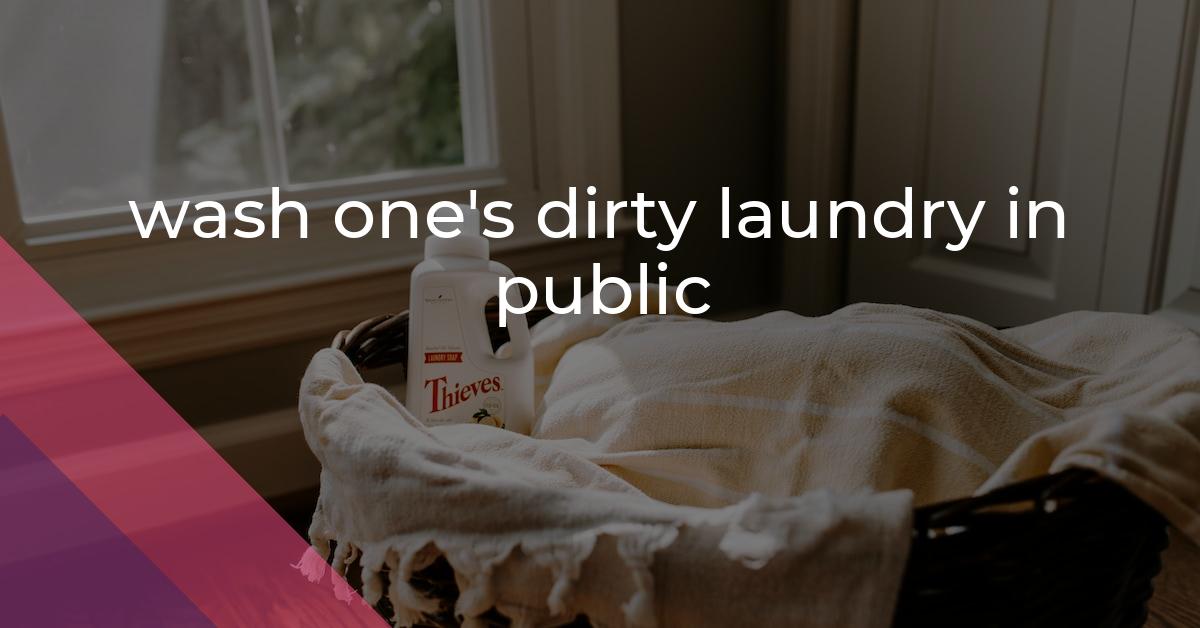wash one’s dirty laundry in public: Idiom Meaning and Origin
What does ‘wash one's dirty laundry in public’ mean?
The idiom "wash one's dirty laundry in public" means to discuss private or embarrassing matters in a public or inappropriate setting, making others aware of personal problems.

Idiom Explorer
The idiom "wipe the slate clean" means to start fresh, without any mistakes or issues from the past. It implies removing any negative history or burdens, allowing for a clean and new beginning.
The idiom "washed out" means to be exhausted or worn out, both physically and emotionally. It can also refer to something that appears faded or lacking in color or intensity.
The idiom "warts and all" means to accept or depict someone or something in their entirety, including their flaws and imperfections. It emphasizes the importance of embracing and showing the complete truth, without hiding any unfavorable aspects.
The idiom "walk the dog" means to take the responsibility of performing a task or fulfilling an obligation, often for someone else's benefit or convenience.
The idiom "walk on the wild side" means to engage in risky or unconventional behavior, often associated with breaking societal norms or boundaries.
The idiom "walk on eggshells" means to proceed with extreme caution and sensitivity in order to avoid upsetting or angering someone.
The idiom "walk in on" means to unintentionally interrupt or discover someone in a private or compromising situation, often resulting in embarrassment or awkwardness.
The idiom "walk a mile in someone's shoes" means to try to understand and empathize with someone's experiences, challenges, or perspectives by putting yourself in their situation.
The idiom "walk all over" means to treat someone poorly or without respect, taking advantage of their weakness or vulnerability.
Unveiling Hidden Shame
The idiom "air one's dirty linen in public" is closely related to the expression "wash one's dirty laundry in public." Both idioms refer to the act of openly discussing or revealing private or embarrassing information or issues in a public or inappropriate setting. While "wash one's dirty laundry in public" emphasizes the notion of prudence and discretion, "air one's dirty linen in public" highlights the act of exposing personal matters that should be kept private.
When someone "airs their dirty linen in public," they openly discuss or reveal personal or embarrassing information in a public setting, disregarding the need for discretion or privacy. This can be seen as a breach of trust or an inappropriate display of personal matters. Similarly, when one "washes their dirty laundry in public," they are openly sharing private or embarrassing information without considering the consequences or the importance of maintaining privacy.
Both idioms convey the idea that personal matters should be kept confidential and not shared in the public domain. These idiomatic expressions are often used to criticize individuals or groups who choose to discuss their private problems or conflicts openly. The metaphorical association between airing dirty linen and washing dirty laundry underscores the need for discretion and the importance of maintaining appropriate boundaries between personal and public life.
One common example of "washing one's dirty laundry in public" is when public figures, such as politicians or celebrities, disclose their personal problems or scandals in public forums or media outlets. This act of sharing personal matters openly can lead to negative consequences, such as damage to reputations or the creation of unnecessary drama. The usage of this idiom in such cases aims to highlight the perceived inappropriateness of discussing private matters publicly and the need for discretion.
Furthermore, the idiom can also apply to everyday situations in which individuals discuss their personal issues or conflicts openly and without discretion. This can be observed in situations where friends or family members openly share intimate details of their personal lives in public or social settings. By using the idiom "wash one's dirty laundry in public," people aim to remind individuals of the importance of maintaining privacy and avoiding unnecessary exposure of personal matters for public consumption.
Both "wash one's dirty laundry in public" and "air one's dirty linen in public" describe the act of openly discussing or revealing private or embarrassing information without considering the importance of discretion or privacy. These idioms are often used to criticize the disclosure of personal matters in public settings, highlighting the need for maintaining appropriate boundaries between personal and public life. The metaphorical association between washing dirty laundry and exposing personal matters emphasizes the importance of prudence and the potential negative consequences of airing private issues in public.
Example usage
Examples of how the idiom "wash one's dirty laundry in public" can be used in a sentence:
- During the press conference, the politician decided to wash his dirty laundry in public by revealing all the scandals within his party.
- She always had a tendency to wash her dirty laundry in public, sharing intimate details of her relationship issues on social media.
- Instead of resolving their issues privately, the feuding neighbors chose to wash their dirty laundry in public by arguing loudly in front of everyone.
More "Embarrassment" idioms



